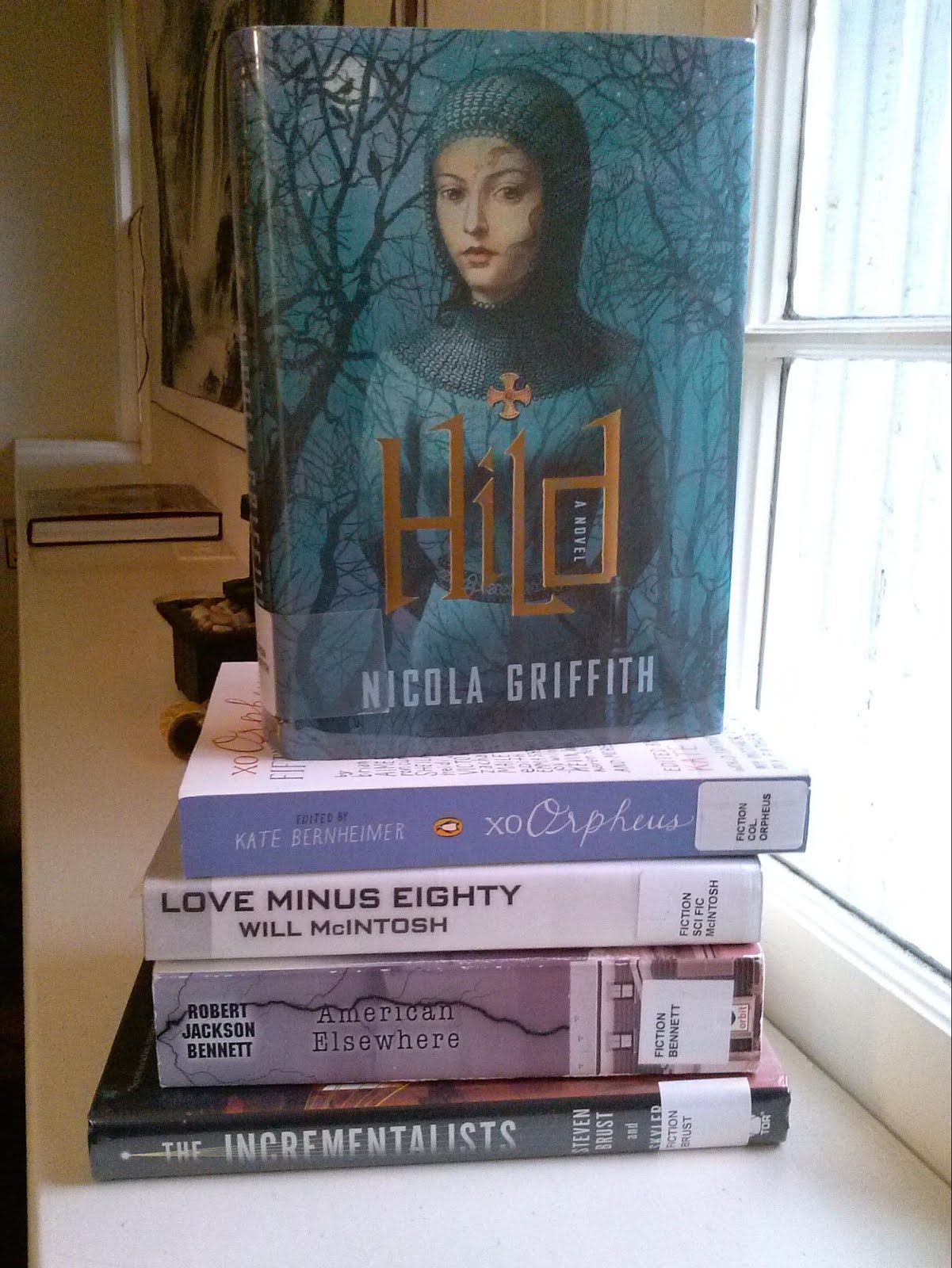Nick Hornby used to write a monthly column for the Believer magazine, where he would list books purchased, books read, and various notes and observations on that month’s reading. All those columns, by the way, are now available in one volume, Ten Years In the Tub. They are funny and very honest about the author’s reading habits. One quick look at books bought and books read lists will tell you that those two are usually drastically different. I personally know (maybe) one person who reads books bought right away. To me, this seems amazing. I never do that. I mean, if I read everything I brought home immediately, I would have never created this Mt. Everest of advanced copies of stuff that is already out in paperback.
Anyway, below are the results of this month’s reading efforts.
Books acquired
These are divided into two categories: books borrowed (i.e. the ones I don’t get to keep), and books bought/received as gifts/wheedled out of gullible sales reps/etc (i.e. the ones I get to keep).
Borrowed this month:

If you think I only took 5 books out of the library this month, rest assured that this is not a complete stack. I excluded obscure non-fiction, depressing Scandinavian literature, odd Japanese literature, and other areas of my reading interest. I will be happy to include those in the future posts if you would like to see them.
Adopted this month (click to embiggen):

It’s leaning ever so slightly, threatening to collapse and kill me as I walk by.
This actually does not look so bad, and that’s because it doesn’t include non-speculative books that also somehow ended up in my house.
And now, a list of books read (sans photos, since some of the books have gone on to bigger and better things), but with links if I reviewed or blurbed a particular book:
1. Jeff Smith, RASL
2. Robert Sibley, The Way of 88 Temples: Journeys on the Shikoku Pilgrimage (aka the book that allowed me to show my coworkers where I actually used to live)
3. Margaret Atwood, In Other Worlds
4. Jack Vance, The Dying Earth
5. Various, Buffy The Vampire Slayer Omnibus # 4
6. Nicola Griffith, Hild
7. Will McIntosh, Love Minus Eighty
8. Jo Walton, What Makes This Book So Great
9. Robert Pohl, Urban Legends and Historic Lore of Washington, DC
10. Wesley Chu, Lives of Tao
11. George Saunders, The Brief and Frightening Reign of Phil
12. Elizabeth A. Lynn, A Different Light
13. Takashi Hiraide, The Guest Cat
14. Ray Jayawardhana, Neutrino Hunters: The Thrilling Chase for a Ghostly Particle to Unlock the Secrets of the Universe
15. Warren Ellis, Darick Robertson, Transmetropolitan, Vol 1: Back on the Street (re-read)
16. Lara Vapnyar, Scent of Pine
17. Chuck Wendig, The Blue Blazes
As is usually the case, the borrowed books got a quicker read than the ones bought. Reading of borrowed stuff is largely motivated by the fact that I have to return these volumes to avoid being chased by angry librarians and to allow some other person to have their history knowledge tested by something like Hild.
Unsurprisingly, I almost entirely failed to read from the bought pile, with Chu being the obvious exception. Well, there is always next month.
So, thoughts? Anything from my to-read stacks that I shouldn’t have put off till next month? Anything on my list you’ve read or want to read?
 I am hoping to get reading back on track with Maggie Nelson’s The Red Parts, which is a peculiar mix of memoir, true crime, and personal essay. I did not think this book was going to be my cup of tea at all, but Maggie Nelson is so good at self-examination, observation, and putting it all into beautiful words, that anything she writes is hard to put down. The Red Parts is about a reopening of a 35 year-old murder of Nelson’s aunt, an occurrence that plunged her family into grief anew. She documents months in the courtroom as the case is reexamined, during which time she conducts an examination of her own, of her family and how it was affected by this terrible and up until now unsolved tragedy. I love writers who write in the liminal areas, whose books give catalogers nightmares, because that is how my mind works as well. I loved both Maggie Nelson’s Bluets and Argonauts as well, although for personal reasons the latter affected me much more deeply than the former. Start with Argonauts if you have never read her non-fiction, but be prepared to find yourself seeking out everything she has ever written, including books you thought were not your cup at all.
I am hoping to get reading back on track with Maggie Nelson’s The Red Parts, which is a peculiar mix of memoir, true crime, and personal essay. I did not think this book was going to be my cup of tea at all, but Maggie Nelson is so good at self-examination, observation, and putting it all into beautiful words, that anything she writes is hard to put down. The Red Parts is about a reopening of a 35 year-old murder of Nelson’s aunt, an occurrence that plunged her family into grief anew. She documents months in the courtroom as the case is reexamined, during which time she conducts an examination of her own, of her family and how it was affected by this terrible and up until now unsolved tragedy. I love writers who write in the liminal areas, whose books give catalogers nightmares, because that is how my mind works as well. I loved both Maggie Nelson’s Bluets and Argonauts as well, although for personal reasons the latter affected me much more deeply than the former. Start with Argonauts if you have never read her non-fiction, but be prepared to find yourself seeking out everything she has ever written, including books you thought were not your cup at all.







